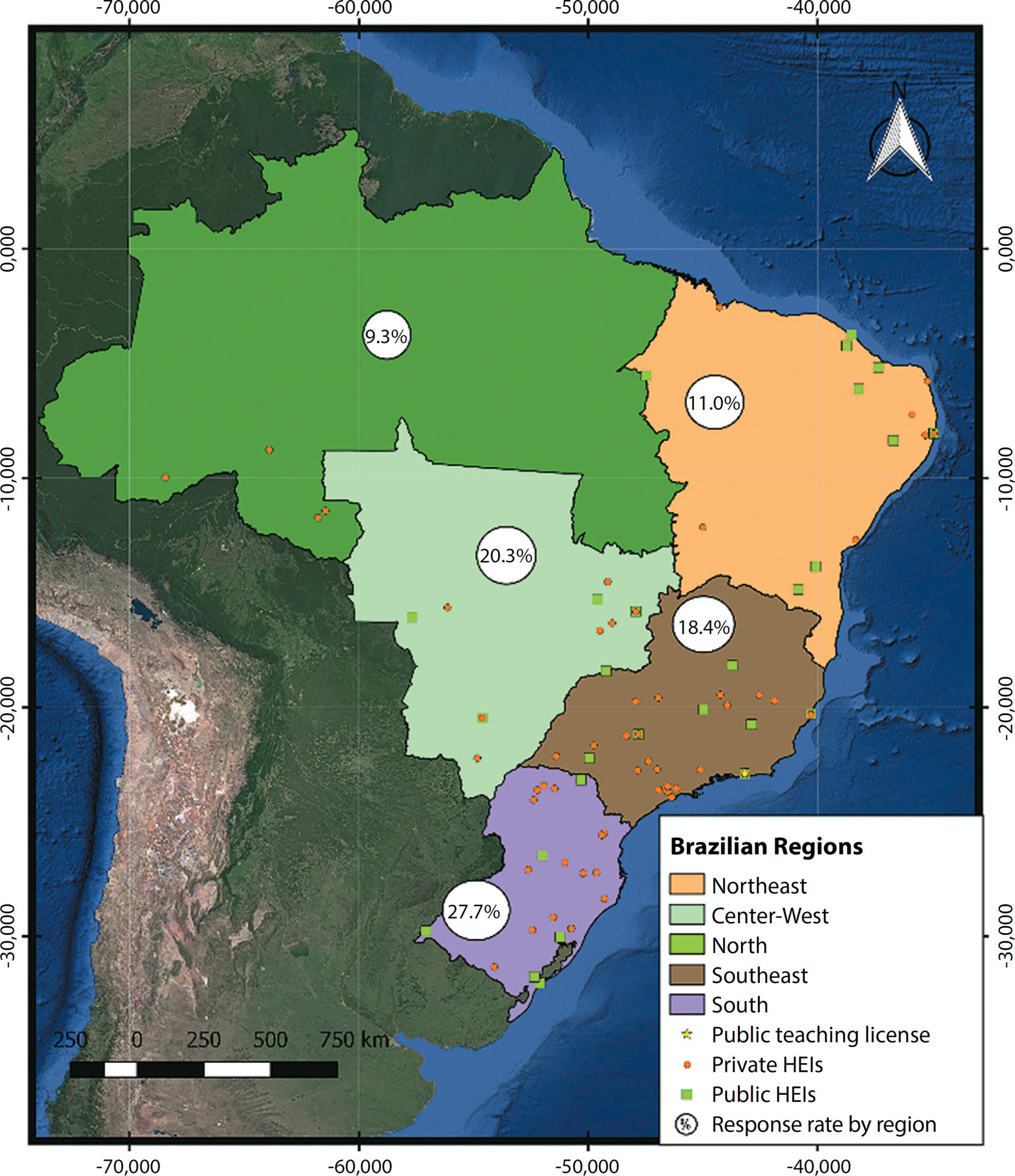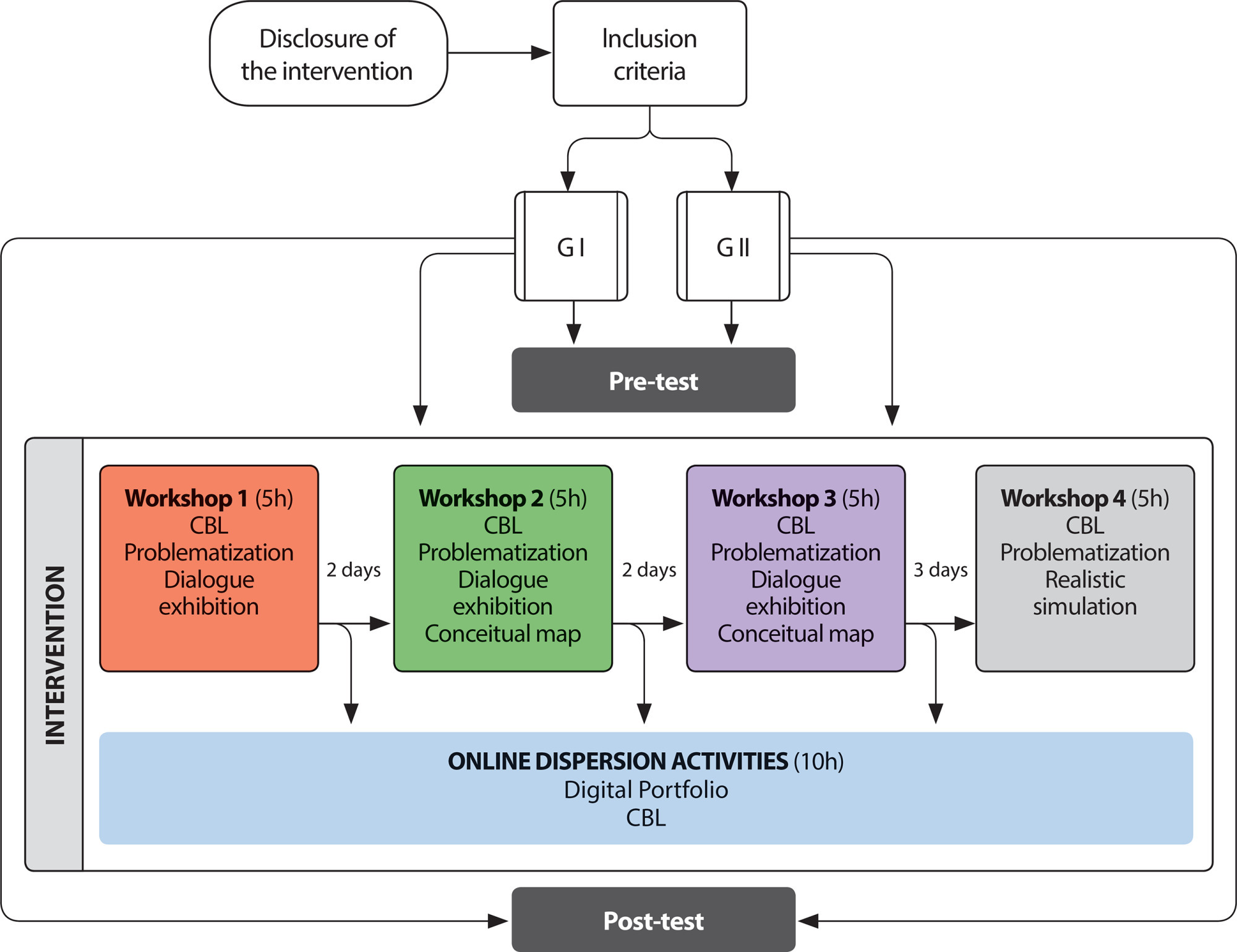-
ORIGINAL ARTICLE12-16-2024
Construction and validation of an educational game on biosafety in the central sterile supply department
Revista Brasileira de Enfermagem. 2024;77(6):e20230478
Abstract
ORIGINAL ARTICLEConstruction and validation of an educational game on biosafety in the central sterile supply department
Revista Brasileira de Enfermagem. 2024;77(6):e20230478
DOI 10.1590/0034-7167-2023-0478
Views0See moreABSTRACT
Objectives:
to construct and validate an educational game on biosafety in the Central Sterile Supply Department of a hospital in Curitiba, PR.
Methods:
the study was conducted using a quantitative approach, employing applied and technological research with an exploratory design. The process was divided into six stages, from the definition of the theme to the validation and application of the game. The study was carried out from May to August 2022, involving 17 nursing professionals from a Central Sterile Supply Department during day and night shifts, as well as 9 judges.
Results:
the study resulted in the construction of a board game named by the authors as “My Health First.”
Conclusions:
the research achieved its objective of constructing and validating an educational game. By reflecting on professional practice and correlating the occupational risks present, the professionals were able to list safe actions, identify problems, and seek solutions.

-
ORIGINAL ARTICLE12-16-2024
Health literacy development of Primary Health Care patients: qualitative research
Revista Brasileira de Enfermagem. 2024;77(6):e20240154
Abstract
ORIGINAL ARTICLEHealth literacy development of Primary Health Care patients: qualitative research
Revista Brasileira de Enfermagem. 2024;77(6):e20240154
DOI 10.1590/0034-7167-2024-0154
Views0See moreABSTRACT
Objectives:
to identify the process of health literacy development among primary care patients, relating it to their self-care practices.
Methods:
qualitative, prospective research with 22 patients from two Family Health Strategy units. Data were obtained through individual semi-structured interviews, examined through descriptive statistics and thematic content analysis.
Results:
the results discuss how participants learn about health and how this resonates in their behaviors, culminating in two thematic categories: “Health knowledge construction”; and “Dialogue between health knowledge construction and patient care actions”.
Final Considerations:
health knowledge is developed mainly through interpersonal relationships, mediated by health professionals through bonding and communication. Community educational actions and training of health professionals in communication can promote health literacy and self-care among patients.

-
ORIGINAL ARTICLE12-16-2024
Analysis of omission of antimicrobial doses in Intensive Care Units
Revista Brasileira de Enfermagem. 2024;77(6):e20240102
Abstract
ORIGINAL ARTICLEAnalysis of omission of antimicrobial doses in Intensive Care Units
Revista Brasileira de Enfermagem. 2024;77(6):e20240102
DOI 10.1590/0034-7167-2024-0102
Views0See moreABSTRACT
Objectives:
to analyze the rate of antimicrobial dose omission in intensive care units.
Methods:
cross-sectional study carried out between March 1 and September 30, 2023, in intensive care units of a University Hospital in Rio de Janeiro.
Results:
the sample consisted of 452 prescriptions and 1467 antimicrobial doses. The dose omission rate was 4.29%. Each antimicrobial prescribed increased the chance of omission by 51%. The strategy of double-checking prescriptions helped prevent 30% of antimicrobial dose omissions (p=0.0001).
Conclusions:
monitoring the omission of antimicrobial doses can guide nursing actions to improve quality and patient safety, contributing to the prevention of medication errors, antimicrobial stewardship and the fight against antimicrobial resistance.
-
REVIEW12-16-2024
Recommendations for guidelines for promoting mental health in the workplace: an umbrella review
Revista Brasileira de Enfermagem. 2024;77(6):e20240086
Abstract
REVIEWRecommendations for guidelines for promoting mental health in the workplace: an umbrella review
Revista Brasileira de Enfermagem. 2024;77(6):e20240086
DOI 10.1590/0034-7167-2024-0086
Views1See moreABSTRACT
Objectives:
to summarize the recommendations of guidelines for promoting mental health in the workplace.
Methods:
an umbrella review, according to Joanna Briggs Institute and Preferred Reporting Items for Systematic reviews and Meta-Analyses methodological assumptions. Data collection was carried out in January 2021 and updated in July 2023 in the American Psychological Association, Cochrane Library, EMBASE, National Library of Medicine, and Scopus databases. Systematic reviews that assessed guidelines with recommendations for mental health care for workers were included. PROSPERO registration CRD42023461845.
Results:
four systematic reviews published between 2015 and 2018 were identified. The abstracts highlighted actions that facilitate and inhibit the recommendations as well as three categories of intervention: primary prevention – worker protection; secondary prevention – promoting workers’ mental health; and tertiary prevention – supporting, monitoring and rehabilitating workers upon returning to work.
Conclusions:
the interventions are based on prevention, promotion and early recognition, support and rehabilitation of mental health problems.

-
ORIGINAL ARTICLE12-16-2024
Psychometric analysis of ProQOL-BR in nursing: building hospital safety and protection
Revista Brasileira de Enfermagem. 2024;77(6):e20240085
Abstract
ORIGINAL ARTICLEPsychometric analysis of ProQOL-BR in nursing: building hospital safety and protection
Revista Brasileira de Enfermagem. 2024;77(6):e20240085
DOI 10.1590/0034-7167-2024-0085
Views0See moreABSTRACT
Objectives:
to analyze the psychometric properties of the ProQOL-BR instrument in hospital nursing professionals.
Methods:
a methodological study to validate the ProQOL-BR. Confirmatory factor analysis, assessment of local and global adjustment quality, Pearson hypothesis testing and Cronbach’s alpha internal consistency analysis were used.
Results:
a total of 490 professionals participated. The model presents adequate quality due to factor weights (λ≥ 0.40), acceptable overall fit quality and adequate chi-square ratio and degrees of freedom (χ2/g.1=2.51) for the parameters of CFI (0.923), GFI (0.902), TLI (0.914) and RMSEA (0.042). In terms of validity, it was shown to be adequate with CC=0.89. The internal consistency obtained by standardized Cronbach’s alpha was 0.761. Criterion validity was shown to be favorable with significant correlations (0.001).
Conclusions:
the instrument was validated regarding content, criteria and reliability. Three questions were removed from the original instrument, ProQOL-BR, leaving the final instrument with 25 questions.

-
12-16-2024
GerenciaDOR™: development of digital technology by nurses for the assessment of patients with chronic pain
Revista Brasileira de Enfermagem. 2024;77(6):e20240050
Abstract
GerenciaDOR™: development of digital technology by nurses for the assessment of patients with chronic pain
Revista Brasileira de Enfermagem. 2024;77(6):e20240050
DOI 10.1590/0034-7167-2024-0050
Views0See moreABSTRACT
Objectives:
to develop a digital technological solution (prototype) for assessing patients with chronic pain.
Methods:
this is a methodological and technological development study based on the Human-Centered Design framework and the principles of Patient-Centered Care. The prototype guides patients through a body diagram and directs them to an evaluation using specific instruments that address the multidimensional aspects of chronic pain.
Results:
the GerenciaDOR* project enables navigation through the Web App screens, providing access to pain assessment features up to the presentation of results.
Final Considerations:
the study describes a systematic approach to pain assessment and expands nurses’ knowledge in pain management. Additionally, it can promote the development of other digital technologies for chronic pain assessment and contribute to a multidisciplinary, patient centered treatment.

-
ORIGINAL ARTICLE12-16-2024
Respectful care for postpartum women with sickle cell disease: a netnographic study
Revista Brasileira de Enfermagem. 2024;77(6):e20230545
Abstract
ORIGINAL ARTICLERespectful care for postpartum women with sickle cell disease: a netnographic study
Revista Brasileira de Enfermagem. 2024;77(6):e20230545
DOI 10.1590/0034-7167-2023-0545
Views1See moreABSTRACT
Objectives:
to analyze principles of respectful maternity care in narratives of postpartum women with sickle cell disease, relating them to Sustainable Development Goals.
Methods:
netnographic study, with two videos published in 2020. Deductive iconographic and thematic analysis by Respectful Maternity Care Charter, organized in MAXQDA.
Results:
principles identified were the right to: freedom from harm and ill-treatment; information, informed consent, refusal of medical procedures, and respect for their choices and preferences including companion; be considered a person from birth, with dignified and respectful treatment; health at the highest possible level; newborns being with their parents or guardians. The Sustainable Development Goals for women by 2030 were not positively contemplated in postpartum women’s experience.
Final Considerations:
it is appropriate that health workers qualify themselves to provide respectful maternity care, with qualified listening, understanding, and resolution of unique demands of postpartum women with sickle cell disease, seeking equality in care for women.

-
REVIEW12-16-2024
Strategies for expanding vaccination coverage in children in Brazil: systematic literature review
Revista Brasileira de Enfermagem. 2024;77(6):e20230343
Abstract
REVIEWStrategies for expanding vaccination coverage in children in Brazil: systematic literature review
Revista Brasileira de Enfermagem. 2024;77(6):e20230343
DOI 10.1590/0034-7167-2023-0343
Views1See moreABSTRACT
Objectives:
to identify the strategies found in the literature for increasing vaccination coverage among children in Brazil. It is justified mainly by the current scenario of falling vaccination coverage.
Methods:
systematic literature review. The search was carried out in the Pubmed (MEDLINE), Embase and Scopus databases, following the PRISMA guidelines.
Results:
initially, 4,824 results were returned. In the end, 6 studies were included for narrative synthesis using the SWiM methodology. Of these, 50% dealt with studies related to the Bolsa Família Program (PBF). The others explored strategies for approaching parents directly, Rapid Vaccination Monitoring (MRV) and the Community Health Agents Program (PACS). The PBF did not guarantee compliance with the conditionality of keeping vaccinations up to date. The MRV and PACS are effective strategies, especially because they allow active search for absentees.
Conclusions:
we conclude that more publications are needed on strategies to increase vaccination coverage among children in Brazil.

-
ORIGINAL ARTICLE04-14-2023
Artificial intelligence in the analysis of emotions of nursing students undergoing clinical simulation
Revista Brasileira de Enfermagem. 2023;76:e20210909
Abstract
ORIGINAL ARTICLEArtificial intelligence in the analysis of emotions of nursing students undergoing clinical simulation
Revista Brasileira de Enfermagem. 2023;76:e20210909
DOI 10.1590/0034-7167-2021-0909
Views0See moreABSTRACT
Objective:
to assess nursing students’ emotions undergoing maternal-child clinical simulation.
Methods:
an observational study, carried out between June and July 2019. The Focus Group technique was used, with 28 nursing students, randomly distributed into three groups, with qualitative (Bardin technique) and quantitative data (Artificial Intelligence) analysis, to analyze emotions through facial expressions, tone of voice and description of speeches.
Results:
we defined two categories: “It was not easy, it was very stressful”; and “Very valuable experience”. In Artificial Intelligence, emotional distribution between face, voice and speech revealed a prevalence of negative valence, medium-high degree of passivity, medium power to control the situation and medium-high degree of obstruction in task accomplishment.
Final considerations:
this study revealed an oscillation between positive and negative emotions, and shows to the importance of recognizing them in the teaching-learning process in mother-child simulation.

-
04-26-2021
Content validity of the nursing diagnostic Breathing Pattern, Ineffective, in children with congenital heart defects
Revista Brasileira de Enfermagem. 2021;74:e20190844
Abstract
Content validity of the nursing diagnostic Breathing Pattern, Ineffective, in children with congenital heart defects
Revista Brasileira de Enfermagem. 2021;74:e20190844
DOI 10.1590/0034-7167-2019-0844
Views0See moreABSTRACT
Objective:
To estimate the content validity of the nursing diagnostic Breathing Pattern, Ineffective, in children with congenital heart defects.
Method:
Methodological study in two stages: 1) integrative literature review; 2) content validation, with 23 nurses. An instrument with 10 related factors and 21 defining characteristics for data collection was used. The analysis by the evaluators was carried out using the relevance criteria. The Content Validity Index was used. Valid results were those above 0.9 with a Wilcoxon test above 0.05.
Results:
The final proposal incorporates nine from the ten causal factors. From them, five do not belong in the NANDA-I list. Regarding the defining characteristics, they were all considered to be relevant, and five are not among the list of signs and symptoms of the NANDA-I taxonomy.
Conclusion:
The findings of this study include specific elements of the pediatric population with congenital heart defect which are not present in the structure of the diagnostic being studied.
-
06-11-2021
Influence of social determinants of health on skin to skin contact between mother and newborn
Revista Brasileira de Enfermagem. 2021;74:e20200138
Abstract
Influence of social determinants of health on skin to skin contact between mother and newborn
Revista Brasileira de Enfermagem. 2021;74:e20200138
DOI 10.1590/0034-7167-2020-0138
Views0See moreABSTRACT
Objective:
to analyze the association of skin-to-skin contact and social determinants of health.
Methods:
this is a cross-sectional study with 187 medical records of newborns from a reference rooming in in northeastern Brazil. An instrument with maternal and neonatal data was used. Analysis was descriptive and inferential statistics. For the associations, a chi-square test was used to measure strength, an Odds Ratio was calculated, with a 95% confidence interval.
Results:
62% of newborns who made skin-to-skin contact at birth were eutrophic, full-term, Apgar > 7, mothers with prenatal care and without abortion. The determinants associated with non-skin-to-skin contact were preterm (CR=3.2;95%CI: 2.72-18.98); 1st minute Apgar < 7 (CR:2.9;95%CI: 2.38-3.06), cesarean section (CR:8.4;95%CI: 4.29-16.57), and unhealthy NB (CR 12.7;95%CI: 4.9-32.67). We used STROBE guidelines.
Conclusion:
skin-to-skin contact was influenced by gestational age, Apgar, delivery, and newborn health.
-
07-09-2021
Sexuality and assessment of physical and psychological symptoms of older adults in outpatient care
Revista Brasileira de Enfermagem. 2021;74:e20200998
Abstract
Sexuality and assessment of physical and psychological symptoms of older adults in outpatient care
Revista Brasileira de Enfermagem. 2021;74:e20200998
DOI 10.1590/0034-7167-2020-0998
Views0See moreABSTRACT
Objective:
to analyze the relationship between affective and sexual experiences and the intensity of physical and psychological symptoms of older adults.
Methods:
observational, cross-sectional and analytical study, guided by the STROBE tool, carried out in a geriatric outpatient clinic. Sociodemographic and health questionnaire, Affective and Sexual Experiences Scale for Elderly, Edmonton Symptom Assessment Scale were used. Descriptive statistical analysis and Spearman correlation were performed.
Results:
forty-five older adults participated, with a mean age of 73.8 years; most (91.1%) were married. The highest averages of symptom intensity were pain (4.9), anxiety (4.8), drowsiness (4.5), and a feeling of well-being (4.5). There was a negative correlation between sadness and the dimensions of sexual activity and affective relationships (rs=-0.365; p=0.014 and rs=-0.386; p=0.009) and between anxiety and sexual activity (rs=-0.308; p=0.040).
Conclusion:
as sadness increases, affective and sexual experiences are less. The greater the anxiety intensity, the lower the sexual experiences.
-
ORIGINAL ARTICLE05-21-2021
Simulation in nursing baccalaureate courses of Brazilian educational institutions
Revista Brasileira de Enfermagem. 2021;74:e20190730
Abstract
ORIGINAL ARTICLESimulation in nursing baccalaureate courses of Brazilian educational institutions
Revista Brasileira de Enfermagem. 2021;74:e20190730
DOI 10.1590/0034-7167-2019-0730
Views0See moreABSTRACT
Objective:
to characterize simulation practices in nursing courses in Brazil, considering the attributes developed, facilities, and challenges encountered.
Methods:
this is a cross-sectional and descriptive study, with a quantitative approach. Ninety-one coordinators of undergraduate courses participated in the study. An electronic questionnaire was used with open- and closed-ended questions.
Results:
the most used simulation modality is Specific Skills. Private courses and courses with integrated curricula most often use High Fidelity Simulation. Understanding the mobilization of affective attributes is still insufficient.
Conclusion:
it is important that undergraduate course managers are aware and take ownership of the elements that permeate simulation and invest to create a favorable environment for its effectiveness.

-
ORIGINAL ARTICLE03-19-2021
Active teaching strategies improve nursing knowledge and skills to assist burn victims
Revista Brasileira de Enfermagem. 2021;74:e20200235
Abstract
ORIGINAL ARTICLEActive teaching strategies improve nursing knowledge and skills to assist burn victims
Revista Brasileira de Enfermagem. 2021;74:e20200235
DOI 10.1590/0034-7167-2020-0235
Views0See moreABSTRACT
Objective:
to evaluate the impact of an educational intervention, on nurses’ self-perception, about knowledge and skills for initial care for burn victims.
Methods:
a quasi-experimental study of the type before and after, with 18 nurses who assist burn victims. The intervention was carried out for 11 days in face-to-face meetings and online activities, and comprised active case-based learning strategies, simulation training, concept maps and digital portfolio. A structured instrument was used to collect sociodemographic data, and another one related to the knowledge and essential skills to the initial care for burn victims.
Results:
The average scores found before the intervention ranged from 2.78 to 3.33 and, after the intervention, they ranged from 3.89 to 4.72. Relevant statistical differences (p <0.005) were found in all questions addressed.
Conclusion:
this educational intervention, based on innovative teaching methods, showed a positive impact on nurses’ knowledge and skills on initial care for people with burns.

-
ORIGINAL ARTICLE02-03-2023
Remote teaching during the COVID-19 pandemic: repercussions from professors’ perspective
Revista Brasileira de Enfermagem. 2023;76:e20220172
Abstract
ORIGINAL ARTICLERemote teaching during the COVID-19 pandemic: repercussions from professors’ perspective
Revista Brasileira de Enfermagem. 2023;76:e20220172
DOI 10.1590/0034-7167-2022-0172
Views0See moreABSTRACT
Objectives:
to understand the repercussions of teaching work in remote teaching during the COVID-19 pandemic in Higher Education Institutions in northern Santa Catarina.
Methods:
a qualitative participatory action research, based on Paulo Freire’s theoretical-methodological precepts. Seventeen health professors participated in two Virtual Culture Circles held in the first half of 2021.
Results:
six generating themes emerged for discussion, which aroused in participants’ feelings and perspectives regarding the remote teaching process in the pandemic context, with an emphasis on the connectivity theme, which generated dialogue through reports of personal experiences.
Final Considerations:
the pandemic has had repercussions in sectors such as health and education. Professors talked about their experience in creating, recreating and adapting to remote teaching and the challenges facing the teaching-learning process, listing the worsening of mental health and the need to learn new digital technologies.

-
ORIGINAL ARTICLE12-21-2020
Regional coordinators of Sao Paulo State prisons in tuberculosis and HIV coinfection care
Revista Brasileira de Enfermagem. 2020;73:e20190738
Abstract
ORIGINAL ARTICLERegional coordinators of Sao Paulo State prisons in tuberculosis and HIV coinfection care
Revista Brasileira de Enfermagem. 2020;73:e20190738
DOI 10.1590/0034-7167-2019-0738
Views0See moreABSTRACT
Objectives:
to analyze the care provided to individuals with Tuberculosis (TB)-HIV coinfection in prison units in the state of São Paulo, according to the regional coordination of prisons.
Methods:
cross-sectional study conducted between 2016 and 2018. A structured questionnaire was applied to 112 directors or health professionals from 168 prison units. Data were analyzed by frequency distribution and multiple correspondence analysis.
Results:
92.9% of participants reported active search for respiratory symptoms, 89.3% offer the directly observed treatment (DOT) for all TB cases, 95.5% anti-HIV testing for all inmates, 92.9% offer HIV follow-up in specialized care services and 59.8% antiretroviral drugs for cases of coinfection. An association was identified between the Northwest and Central regional coordinations and deficient human resources and low performance of actions for the diagnosis and follow-up of cases.
Conclusions:
although most prison units perform planned actions for the care of coinfected persons, some places need support to guarantee access to these actions.

Search
Search in:
Nuvem de Tags
Adolescente (85) Atenção Primária à Saúde (239) COVID-19 (91) Criança (91) Cuidados de Enfermagem (269) Educação em Enfermagem (151) Educação em Saúde (139) Enfermagem (930) Enfermagem Pediátrica (86) Estudantes de Enfermagem (77) Estudos de Validação (131) Família (87) Idoso (208) Promoção da Saúde (99) Qualidade de Vida (104) Saúde do Trabalhador (86) Saúde Mental (145) Saúde Pública (82) Segurança do Paciente (150) Tecnologia Educacional (100)



